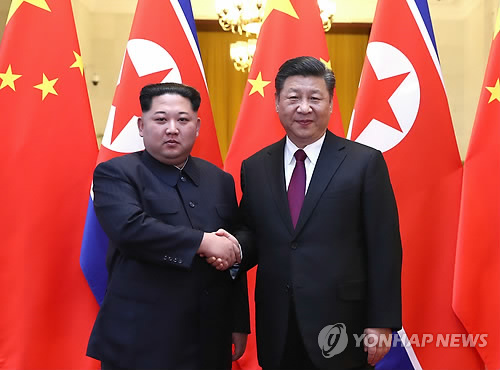North Korean leader Kim Jong-un has visited China at the invitation of President Xi Jinping and reaffirmed his commitment to denuclearization during their first summit, the two countries' media said Wednesday.
The North's leader made an "unofficial" visit to China from Sunday to Wednesday, accompanied by his wife Ri Sol-ju and key officials, including de facto No. 2 figure Choe Ryong-hae, according to the North's state news agency.
It was Kim's first foreign trip since he took office in late 2011.
The summit came as Kim plans to meet the leaders of South Korea and the United States in the coming months.

His trip was seen as aimed at mending long-frayed ties with China, North Korea's sole ally and key economic benefactor, which has joined international sanctions over the North's nuclear and missile programs.
By holding the meeting, Kim also appeared intent on securing diplomatic leverage ahead of talks with Seoul and Washington over North Korea's nuclear programs. Kim is set to hold summits with President Moon Jae-in in late April and is supposed to meet U.S. President Donald Trump by May.
For China, the summit also seemed to offer a chance to highlight its role as a mediator in resolving North Korea's nuclear and missile programs.
The North's leader told Xi that the situation on the Korean Peninsula is starting to "get better" as it has taken an initiative to ease tensions and propose for peace talks, according to China's Xinhua News Agency.
"It is our consistent stance to be committed to denuclearization on the peninsula," in accordance with the will of late founder Kim Il-sung and former leader Kim Jong-il, Kim was quoted as saying by the report.
Trump has agreed to meet with Kim after South Korean envoys relayed Kim's expression of his commitment to denuclearization.
North Korea's leader also officially revealed his willingness to hold summits with the leaders of South Korea and the U.S., according to Xinhua. North Korea's state media has kept mum over news about those planned summits.
Kim said that North Korea's denuclearization is up to the South and the U.S.
"The issue of denuclearization of the Korean Peninsula can be resolved, if South Korea and the U.S. respond to our efforts with goodwill, create an atmosphere of peace and stability while taking progressive and synchronous measures for the realization of peace," he was quoted as saying by Xinhua.
Kim did not elaborate on what "progressive and synchronous" steps mean.
The North's Korean Central News Agency reported that Kim invited Xi to Pyongyang at his convenient time and the Chinese leader accepted it.
During the summit, Xi expressed a "warm welcome" to Kim, saying that ties between Beijing and Pyongyang should be continuously developed.
Tensions between the North and the U.S. heightened last year, amid North Korea's advancement in its nuclear and missile programs. Kim and Trump exchanged personal insults and bellicose rhetoric, raising fears about war on the divided peninsula.
It conducted its sixth and most powerful nuclear test in September last year. The North launched three intercontinental ballistic missiles (ICBMs) last year, which analysts say are capable of reaching the U.S. mainland.
But the North extended a rare olive branch to Seoul in January, as Kim expressed his willingness to send athletes to the PyeongChang Winter Olympics held in the South last month.
The U.S. has been carrying out its campaign for "maximum pressure" to make the North give up its nuclear arsenal and bring it to the negotiation table.
Washington has vowed to keep up its pressure campaign until the repressive regime takes sincere steps toward denuclearization even after it has agreed to a summit with the North.
South Korea's spy agency told lawmakers this week that the South plans to simultaneously seek to provide a security guarantee for North Korea and make the North give up its nuclear weapons when the two Koreas hold a summit.
Seoul's unification ministry gave a positive assessment of signs of better ties between the North and China.
"Ahead of the North's summits, we believe that an improvement in Pyongyang-Beijing relations will help resolve the North's nuclear issue and bring peace to the Korean Peninsula," Baik Tae-hyun, spokesman at Seoul's unification ministry, told a press briefing.

